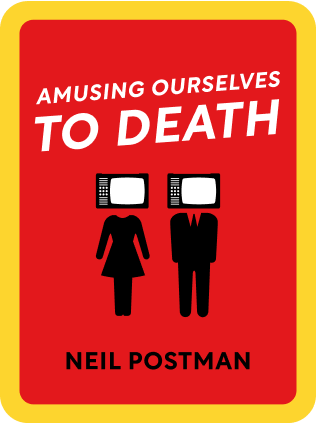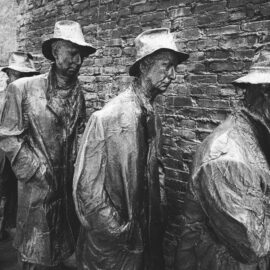

This article is an excerpt from the Shortform book guide to "Amusing Ourselves to Death" by Neil Postman. Shortform has the world's best summaries and analyses of books you should be reading.
Like this article? Sign up for a free trial here .
What are the best Amusing Ourselves to Death quotes by Neil Postman? Do Postman’s observations from 1985 still hold true today?
Although Postman’s book Amusing Ourselves to Death was published over thirty years ago, the messages still hold true today, if not more than ever. Postman warns us of a world that is more focused on entertainment than truth and value.
Continue reading for some of Neil Postman’s quotes from Amusing Ourselves to Death.
Amusing Ourselves to Death by Neil Postman
In Amusing Ourselves to Death, Neil Postman argued presciently 36 years ago that television was reshaping our culture and trivializing public life—news, politics, religion, education, and business—by turning it into entertainment. He warned that we would become so inundated with irrelevant information that we’d lose sight of what was important—even worse, we wouldn’t care as long as we felt entertained. With the proliferation of digital media today and worries about excessive “screen time,” his analysis still resonates.
Here are six of the best Amusing Ourselves to Death quotes with explanations:
“Americans no longer talk to each other, they entertain each other. They do not exchange ideas, they exchange images. They do not argue with propositions; they argue with good looks, celebrities and commercials.”
If credibility on television (not actual truthfulness) is what counts, politicians don’t have to tell the truth—they just have to appear sincere. Thus, Nixon’s biggest problem wasn’t lying, but looking like a liar on television.
In contrast, Ronald Reagan, a former actor, looked good and came across as so sincere on television that his frequent distortions and misrepresentations didn’t undercut his popularity or likeability. In fact, as public interest in his presidential misstatements declined after some initial news coverage, so did further reporting on them.
“What is happening here is that television is altering the meaning of ‘being informed’ by creating a species of information that might properly be called disinformation. I am using this world almost in the precise sense in which it is used by spies in the CIA or KGB. Disinformation does not mean false information. It means misleading information–misplace, irrelevant, fragmented or superficial information–information that creates the illusion of knowing something but which in fact leads one away from knowing.”
Even when events get widespread news coverage, people still know little in terms of history, context, or implications. Yet everyone has an opinion. But today, opinions are more like emotions than they are like the nuanced and informed opinions people formed in the 18th and 19th centuries. Polling indicates that today’s opinions change, like emotions, from one day or week to the next.
The information Americans possess is really a type of disinformation. In the 1980s, disinformation referred to bits and pieces of misleading information spread by Soviet and U.S. spies, which created a false sense of knowledge. Disinformation is also a consequence of packaging news as entertainment. We know about a lot of things without knowing anything in any depth.
“When a population becomes distracted by trivia, when cultural life is redefined as a perpetual round of entertainments, when serious public conversation becomes a form of baby-talk, when, in short, a people become an audience, and their public business a vaudeville act, then a nation finds itself at risk; culture-death is a clear possibility.”
Throughout human history, the form or technology of communication has dictated what ideas we express and how we express them. In replacing the Age of Typography or print, the Age of Television changed the content of our public discourse by redefining every aspect of public life, from politics to religion, as entertainment or show business.
We’re in essence “amusing ourselves to death”—that is, hastening the death of our culture by accommodating ourselves to television’s way of defining things, without thinking about or even noticing what’s happening.
“The television commercial is not at all about the character of products to be consumed. It is about the character of the consumers of products.”
Making a rational decision requires a discourse: the seller makes a proposition, or claims about the products, which the buyer subjects to rational analysis.
But commercials don’t make product claims. They’re based on images—not words—designed to appeal to emotions; they’re mini-dramas. For a commercial, truth is irrelevant—the viewer can like or hate it, but he can’t refute it.
Television has shifted the focus of advertising from the nature and quality of the product to the character of the consumer—that is, to his fantasies and concerns, deduced from market research. Businesses aim to make consumers feel good by reassuring them through commercial psychodramas.
“For in the end, he was trying to tell us what afflicted the people in ‘Brave New World’ was not that they were laughing instead of thinking, but that they did not know what they were laughing about and why they had stopped thinking.”
We don’t need to agree on the answers; just asking the questions activates and reorients our minds. These and other questions are as applicable to computers as to television. For instance, computers teach us that all we need in order to solve any problem is sufficient data. However, data won’t address most personal problems, and it may be that computers ultimately create as many problems as they solve.
Only by seeing and understanding what it’s doing can we hope to gain control over television, the computer, or any other technology. The problem in Huxley’s Brave New World wasn’t that people were happy and laughing without thinking. It was that they’d forgotten what they were laughing about and why they’d stopped thinking.
“I believe I am not mistaken in saying that Christianity is a demanding and serious religion. When it is delivered as easy and amusing, it is another kind of religion altogether.”
Throughout history, great religious leaders have given people what they needed rather than what they wanted. Nonetheless, religious programs strive to make people feel good. They extol affluence—audiences are encouraged to strive for wealth or celebrate it if they have it. This also seems to put them into a mood to contribute millions to their favorite preachers, who become celebrities. God becomes subordinate.
Thus, television transforms personally challenging religions like Christianity into something easy, self-serving, and trivial—which isn’t a religion at all.

———End of Preview———
Like what you just read? Read the rest of the world's best book summary and analysis of Neil Postman's "Amusing Ourselves to Death" at Shortform .
Here's what you'll find in our full Amusing Ourselves to Death summary :
- How television reshaped our culture and trivialized public life by turning it into entertainment
- Why America is moving towards a dystopian, Huxleyan future
- What you can do to gain control over the technology in your life






